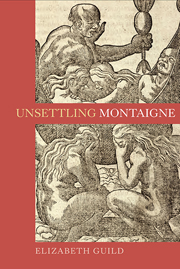Book contents
- Frontmatter
- Contents
- Acknowledgements
- Author's Note
- Abbreviations of Journal Titles
- Chronology
- Introduction
- 1 The Possibility of Their Being Otherwise
- 2 ‘Je ne vois le tout de rien’: The Cannibal and the Place of Knowledge
- 3 Cannibal, Beloved: On Eating What is Good …
- 4 Confessions: The Desire for Knowledge, the Passion for Ignorance
- 5 Tickling, Shaking, Shitting
- 6 The Place of the Brother
- 7 Uncertain Futures
- Bibliography
- Index
7 - Uncertain Futures
Published online by Cambridge University Press: 05 April 2014
- Frontmatter
- Contents
- Acknowledgements
- Author's Note
- Abbreviations of Journal Titles
- Chronology
- Introduction
- 1 The Possibility of Their Being Otherwise
- 2 ‘Je ne vois le tout de rien’: The Cannibal and the Place of Knowledge
- 3 Cannibal, Beloved: On Eating What is Good …
- 4 Confessions: The Desire for Knowledge, the Passion for Ignorance
- 5 Tickling, Shaking, Shitting
- 6 The Place of the Brother
- 7 Uncertain Futures
- Bibliography
- Index
Summary
If you place two or three things next to each other that have never been next to each other before, this will produce a new question. And nothing proves the existence of the future like a question.
What is the relationship between Montaigne's questions – not only the questions he explores but also his preference for inquiring rather than resolving or asserting – and the future, between his writing and its readers? Here I return to the themes and problems of my earlier chapters, to consider how questions – possibilities raised by new placings of things, new relationships between them (which we sometimes also call love) – like the effects of figuration in Montaigne's writing, help build the text's relationship with the future. Whether through play, seduction, surprise, disquiet or unsettling, what kinds of reading do his questions and reconfigurations engage? I shall focus on what is unsettling, and, as before, what sustains the reader's relationship with testing material.
Sacrifice: ‘une estrange fantasie’
I shall begin with the relationship between sacrifice and the ethics of writing. Early modern French culture inherited an ethical tradition founded on sacrifice and self-sacrifice, as required by unconditional belief in God and respect for the law. Whilst the law retains an unconditional authority for Montaigne, his representation of sacrifice and self-sacrifice in the Essais tends to accentuate themes of ambiguity, illusion, self-deception, cruelty and destructiveness. Sacrifice and self-sacrifice seem far from a secure foundation for ethical relations, whether they originate in a Judaeo-Christian doctrine or a more secularized model. But what else could stand between humans and their ‘inhumanité’ (inhumanity) (p. 53)?
- Type
- Chapter
- Information
- Unsettling MontaignePoetics, Ethics and Affect in the Essais and Other Writings, pp. 242 - 274Publisher: Boydell & BrewerPrint publication year: 2014



